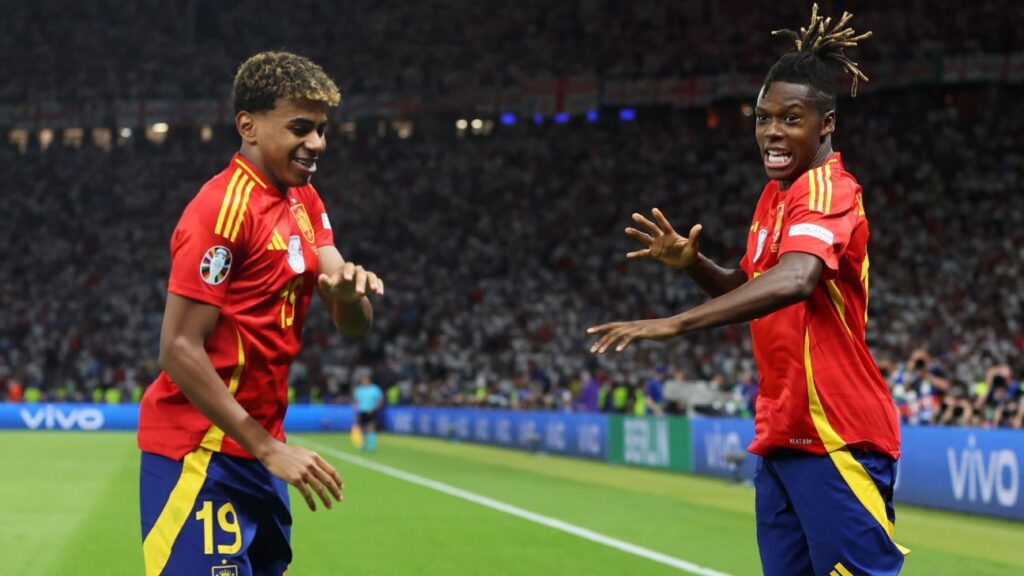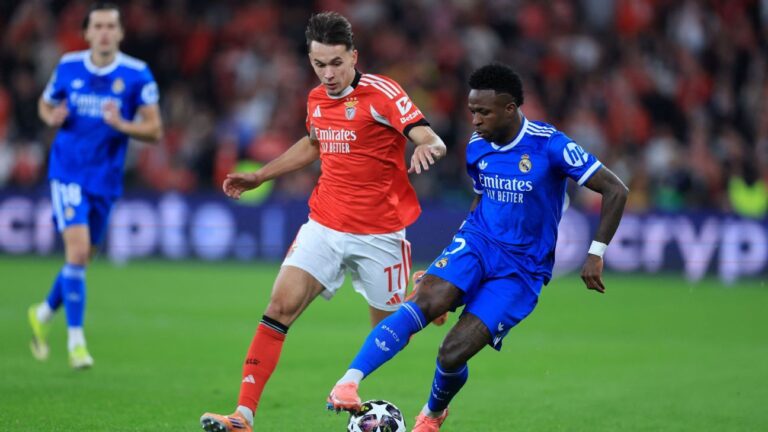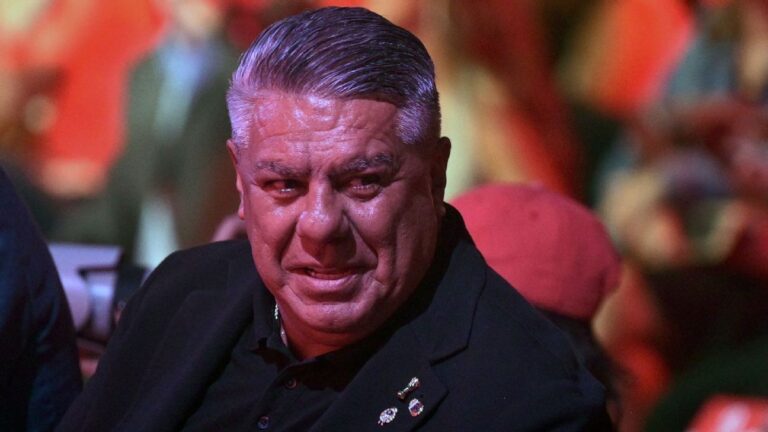A more modern Spain side on and off the pitch won the Euro 2024 for a record-breaking fourth time Sunday and are already eyeing more success in the United States, Canada and Mexico at the 2026 World Cup.
“Champions of Europe … and now we’ll go all out for the World Cup,” said Nico Williams, one of the symbols of this new-look Spain team as well as a goal scorer and the Player of the Match in the 2-1 final win over England.
Spain were the best team in Germany. They won all seven matches — six in normal time and one in extra time — and scored 15 goals, a new tournament high. They beat holders Italy, hosts Germany and pre-tournament favourites France and England. They did so playing a brand of football which, while there was still plenty of possession at times, has evolved under coach Luis de la Fuente in the last 18 months. A large reason for that is down to young wingers Williams, who is 22, and Lamine Yamal, who turned 17 the day before the final.
Speaking after beating England, De la Fuente praised his team for adapting to the demands of modern football. The subtext was that Spain’s approach had gone stale. After winning back-to-back Euros and a World Cup between 2008 and 2012 with a possession-heavy style, a fallow period followed. The low points included a group-stage exit at the World Cup in 2014 and penalty shootout defeats to Russia and Morocco in the same competition in 2018 and 2022, respectively.
Spain had over 75% possession in both of those games and a combined 36 shots but could only muster one goal across 240 minutes of football. Breaking down teams who sat deep had become a problem. De la Fuente, who replaced Luis Enrique after that Morocco loss in 2022, said it was time to update the team’s style without losing their roots.
“Football evolves, not just technically but tactically,” he said. “The teams [between 2008 and 2012] coached by Luis Aragonés and Vicente del Bosque were the best of their era and were innovators.
“But now we have more versatility in our game and take advantage of the characteristics of the players that we have. We have pace on the wings, control and possession in the middle and a very solid defence — that has given us a lot of balance in all areas of the game.
“We have caught up with the demands of modern football. It is a natural change and I think it was time to make it.”
Williams and Yamal are at the centre of the shift. They combined for the opening goal against England and allow Spain to be more direct if needed. They have good in-game intelligence, too. If it’s not working outside, they come inside and try their luck, especially Yamal. They often pop up on the same flank, too. That unpredictability is a huge asset to Spain.
The numbers back that up. Yamal, named the Young Player of the Tournament, was involved in five of Spain’s 15 goals — four assists and that stunning equaliser against France in the semifinal — and Williams in three.
There are other nuances in the point De la Fuente made. The control and possession in the middle is now dealt by players with a contrasting build to Spain midfielders of the past. Rodri and Fabián Ruiz measure over 6-foot-2 and tower above Andrés Iniesta and Xavi Hernández, who were both in attendance at the Olympiastadion this past weekend, along with Spain’s record scorer David Villa. The injured Pedri is more similar to Xavi and Iniesta, while other La Roja legends Sergio Busquets and Xabi Alonso are closer to Rodri and Ruiz’s height, but the differences are clear.
Fundamentally, though, the idea has not changed drastically. It is a style based on technique and positioning which has brought success across men’s, women’s and youth football for Spain. Prior to becoming the coach of the senior side, De la Fuente won the U19 and U21 Euros. He also took the U23s to a silver medal at the Olympic Games. Nine players involved in those successes were part of the 26-man Euro 2024 squad.
Spain have also won many trophies in recent years in the women’s game at youth level and that has translated into the senior game as well. La Roja are now the holders of both the men’s and women’s UEFA Nations League titles, the men’s Euros and the Women’s World Cup.
That base and understanding of the game is a large reason why they prospered in Germany without having the star names other teams had. It is why Dani Olmo slotted in brilliantly when Pedri got injured. It is why when Rodri went off at half-time against England, the walls didn’t cave in because Martín Zubimendi knew what his role was. Mikel Merino and Mikel Oyarzabal, who scored the 86th-minute winner in the final, both also made big contributions off the bench.
That balance and interchangeability is behind De la Fuente’s warning that this team are still hungry for more success. They beat England with Rodri injured, Pedri out and midfielder Gavi — who was drafted in as a support act for the final as the 27th man — missing with an ACL tear. That could be Spain’s starting midfield at the World Cup in two years. Young Barça defender Pau Cubarsí, cut at the last minute from the Euros squad, will also be there if his breathtaking development continues. Williams and Yamal will be 23 and 18 when the tournament starts, respectively. Others will likely emerge.
“These players have made history and they still have a long way to go,” De la Fuente said auspiciously.
The unity and makeup of the team off the pitch gives another meaning to this being a modern Spain side, too. Again, Williams and Yamal are at the heart of that. As young Black men born in Spain to immigrant parents, they have been unintentionally championed as emblems of a more diverse country.
The story of Williams’ parents coming to the country from Ghana, trekking across the Sahara, is well known. Yamal, meanwhile, is the son of a Moroccan and an Equatorial Guinean who was born in Catalonia and grew up in the poor neighbourhood of Rocafonda, outside of Barcelona. His roots are stitched on his boots in the form of the national flags of his parents’ homeland and the numbers 304 — the zip code for Rocafonda.
They are now idols for kids across Spain. They wear it well. Rodri says their youthful innocence rubs off on the squad. Their dancing and joking are more akin to Brazilian football than Spanish football but has been well received by teammates and fans.
“They are two kids with no ceiling,” goalkeeper Unai Simón said after the final. “They’ve been so important for us here, not just for what they have done on the pitch but for what they transmit to the group. I was nervous on the bus before the game and they were dancing, enjoying every moment of being able to play football. Seeing them like that relaxes you. You have to approach life like them, with joy.”
It felt fitting that they combined for the opener against England.
It is a modern team in the sense that it is not dominated by Real Madrid and Barcelona, either. There were 10 different clubs represented in the Sunday’s starting lineup, while regional rivalries have also been cast aside. There is a strong Basque presence in the squad and Catalan full-back Marc Cucurella, one of the revelations of the tournament and a cult hero now in Spain, set up Basque forward Oyarzabal for the clincher.
They have all been pulled together by Álvaro Morata, who may only have scored one goal in seven appearances at the Euros, but who the players respect hugely as a captain. He has also been very open about his own issues, detailing how he has struggled psychologically at times and needed help. He sought it before the tournament from Iniesta and Bojan Krkić, who experienced similar moments in their careers. “Without them, I wouldn’t have been here [at Euro 2024],” Morata said Sunday.
A much more jovial Morata was on show as he MC’d Spain’s celebrations back in Madrid on Monday. He won’t have a voice for a week.
“Where’s Jamal Musiala?” he joked as he introduced a topless Dani Carvajal, who had marked the Germany star in the quarterfinal. There were plenty of other fun moments but there was also genuine affection for his teammates as he welcomed each of them on to the stage. Winning, of course, helps foster that atmosphere, but you get the genuine feeling this Spain team became a very modern family during their six-week stay in the Black Forest in the south of Germany.
That should bode well for the future, even if they will have a target on their backs again now. Cucurella noted they benefitted from being unfancied at Euro 2024, giving them “nothing to lose,” but teams will be out to beat them again now after they modernised their game to leave Germany with the Henri Delaunay Trophy.




